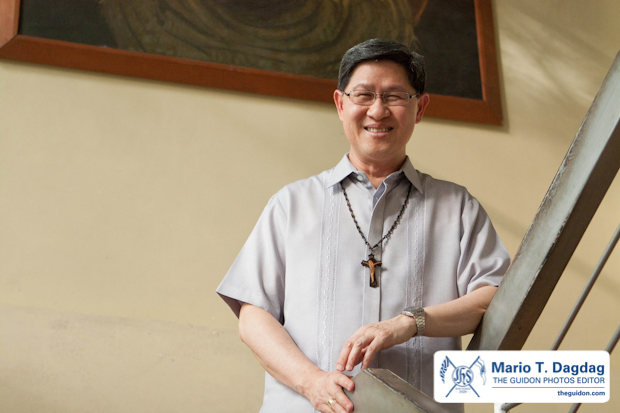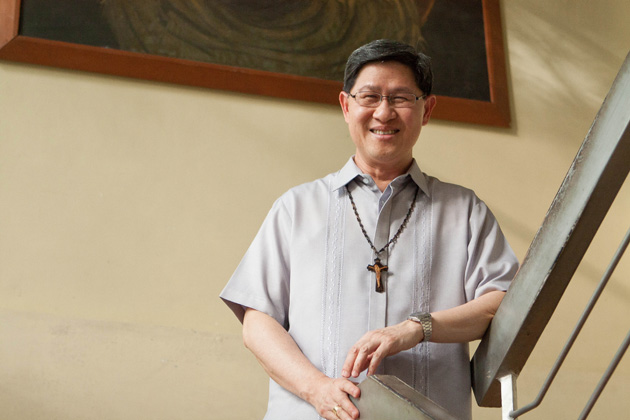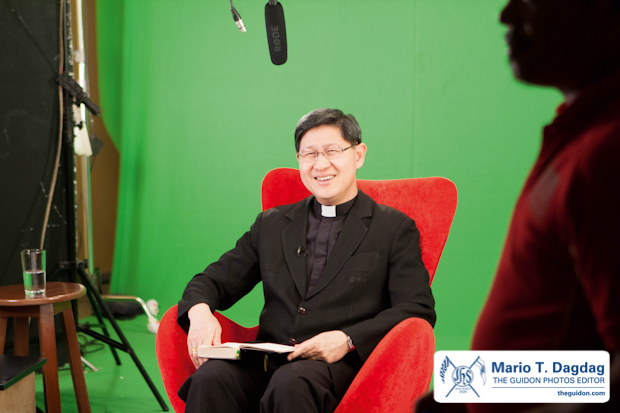
FULL-FLEDGED CARDINAL. Aside from continuing his duties as Archbishop of Manila, newly-elevated Cardinal Tagle returns from the Vatican with greater responsibilities in his hands.
Photo by Mario T. Dagdag.
WHEN HE went to see the Vatican’s Cardinal Secretary of State on that fateful October afternoon, Luis Antonio “Chito” Gokim Tagle, the newly installed Filipino cardinal of the Roman Catholic Church, recalls that he did not expect to hear news of his appointment by Pope Benedict XVI.
“I wasn’t able to utter a word. It was totally unexpected on my part.”
Tagle was in a meeting of the Synod of Bishops in Rome last October 23, 2012, when a seminarian handed him a piece of paper. Written on it was a phone number that he had to call during break time that morning. Little did he know that the number would connect him to the Holy See’s Secretariat of State.
When Tagle called, the person on the other line told him that he should come to the office at 4:50 PM. On his way, he suspected that he was about to be assigned to a mission to Syria, since Benedict previously expressed his intention to send a delegation from the synod to the troubled country.
However, the purpose of the sudden meeting—apparently with the Cardinal Secretary of State Tarcisio Bertone—was not at all related to Syria. Tagle was informed, through a letter from the pope written in Latin, that a consistory would be held the following month, and that he would be among six new cardinals created.
On November 24, the Roman Catholic Church, especially Filipino Roman Catholics around the world, expressed joy as the pope officially elevated Tagle into the College of Cardinals.
Unexpected and unfathomable
There are different reasons why perhaps Tagle did not earlier imagine himself as a cardinal.
At 55, Tagle is still relatively young—both his parents Manuel and Milagros witnessed the public consistory at St. Peter’s Basilica. Tagle is currently the second youngest cardinal, next to India’s Baselios Cleemis Thottunkal, who is 53 years old.
In addition, the said consistory, which installed only six new cardinals, was unusual, since the pope already elevated 22 cardinals in February. The one in November, therefore, came as a total surprise.
This is not to mention that it has only been around a year since Tagle replaced Gaudencio Cardinal Rosales as archbishop of Manila on December 12, 2011.
More than anything, however, Tagle points to the fact that he is just a simple human being. He finds it overwhelming that the Church has put so much trust in him.
He shares that even before becoming archbishop of Manila, when Pope John Paul II appointed him in 2001 as bishop of Imus, Cavite—his hometown—he also kept on asking himself one question: “Am I really fit to be a bishop?”
“I thought I was already doing quite well as a priest, as seminary personnel, as a rector, as a teacher of theology,” he says, not expecting bigger responsibilities then.
“What a shock to me when I was named the bishop of Imus! But, a further shock when I was tasked to be archbishop of Manila! And then, after a year, a cardinal!” he shares, laughing.
“I guess it will take me my lifetime to ponder on this.” He does not fully understand, he admits, how his life has turned out so far. Still, he draws inspiration from Mary and Jesus, who, according to him, “probably did not understand many things that were part of [their] mission.”
Yet he also holds on to what Benedict told him on the day he knelt before him to receive the cardinal’s gold ring and red biretta. Tagle recalls that as the pope held his face with both hands, “He at once assured me, ‘The Lord will bless you. The Lord will be good to you.’”
Inspired by the Ateneo education
From his academic credentials to the very manner he appeals to people through his homilies, Tagle seems to possess all the qualities that would make a good cardinal.
His academic record includes bachelor’s degrees with highest honors in philosophy and sacred theology from the Ateneo de Manila University and the Loyola School of Theology (LST), respectively. He took further studies at the Catholic University of America in Washington, DC, graduating summa cum laude with a licentiate and a doctorate in sacred theology.
“He is very intelligent,” says Fr. Emmanuel Alfonso, SJ, executive director of the Jesuit Communications Foundation (Jescom) and a former student of Tagle at LST.
Alfonso shares how colleagues and fellow priests look up to how Tagle performs his duties as a bishop with sheer passion and hard work. “A priest told me, ‘You can’t work sloppily with Bishop [Tagle], because he is very industrious, right? And he’s kind.’ So you cannot be not like him because he himself leads by example,” he said in a mix of English and Filipino.
Tagle has clearly taken the Atenean value of magis to heart, as well as his training to become a “person for others.” He attributes the kind of attitude towards excellence that he has, which a lot of people regard him for today, to his college years.
“Aside from the knowledge or the content of knowledge, the information I got from the Ateneo, I think what’s in a way more profound was the drive to excellence [that I got here]—to achieve excellence in whatever you are doing.” he says. “If you are going to do it, you have to give the best that you could.”
Tagle’s brilliance is apparent in the way he carries out his priestly functions. “He gives very long homilies,” remarks Alfonso, “but you do not mind.” In fact, the cardinal elicits a whole range of emotions when speaking to congregations.
Such was evident, for instance, during the Thanksgiving Mass he celebrated last December 7 at the Church of the Gesù, about two weeks after his installation. “You get entertained. You cry. You come out inspired and full of insights about the Catholic faith,” Alfonso says.
Theology Department Assistant Professor Amalia Teresita Rosana, PhD echoes Alfonso’s sentiments. When she was chair of the department, they invited Tagle to give a lecture. “And since then, every time he would give a presentation that happens to be on campus, I would attend,” she shares.
Rosana says she admires Tagle’s homilies and talks because “he shares very real stories from his own experience as a pastor and, thus, the people respond with applause.”
A new evangelization
Tagle, despite his hectic schedule, still manages to engage in media by being the presenter of television programs The Word Exposed and Kape’t Pandasal, both produced by Jescom. In fact, The GUIDON held its interview with the cardinal after his shoot for the Gaudete Sunday episode of The Word Exposed, which lasted for at least an hour and a half.
He also has a constantly updated Facebook page under the name Bishop Luis Antonio G. Tagle, which has reached over 114,ooo likes as of press time.
What this affirms is that, in the face of the complex realities and issues arising within an increasingly globalizing and technologically advancing world, a pressing challenge that confronts the Church today is how it will preach the truths of the faith through more contemporary methods of evangelization.
When it comes to such complex realities and issues, Tagle stands firm with the Church. For example, in light of the hotly debated Reproductive Health (RH) bill, he lamented the vote of Congress in favor of the bill as “unfortunate and tragic” in a statement released by the Archdiocese of Manila last December 13.
At the same time, while he remains loyal to the Church, he is no demagogue quick to condemn those who oppose it. He distinguished himself from a number of other Church hierarchs whose pronouncements led to the further worsening of the already bastardized discourse on the RH bill, as a result of their hurtful and condemnatory statements and threats.
Instead, he has constantly encouraged Filipinos towards fruitful dialogue for the sake of the common good, with the reminder to be more understanding and more loving of each other.
At an anti-RH bill rally held in Makati last December 12, he appealed, “That’s why I’m asking everyone to let love rule our hearts as we stand firm in our convictions and principles. To stand by one’s principles does not mean losing trust on those who hold different views.”
Humility and opportunities
Tagle believes that this is a call for humility, especially for the Church, if it desires to remain a relevant institution proclaiming a universal message.
After all, it is the same kind of humility that the new cardinal is admired for. When asked about his reaction upon learning that he was to be made cardinal, Tagle says he instantly became a stranger to himself.
He says that he began asking, “Who am I? Being cardinal is not part of my self-understanding, but I guess I just have to grow into it.”
He does not ultimately know why, but he is certain that preparing beforehand is what it takes to live in the future. “You don’t prepare to face issues while they’re already there. Your immediate preparation happens way, way, way behind, years and years before.”
He then encourages Ateneans to take life seriously—“Not to deprive ourselves of youthfulness and joy, but to really grow and to learn and to become a better person whenever the opportunities are there.”
Throughout The GUIDON’s entire conversation with the new prince of the Church, what emerges naturally is the fact that, whether he is aware of it or not, Tagle is a living example of the things he talks about. Now that he is a cardinal, his promise to the Church and the people who are one with him in his ministry is perhaps no less than himself—that is, the life he has offered to God and will share to the world.





